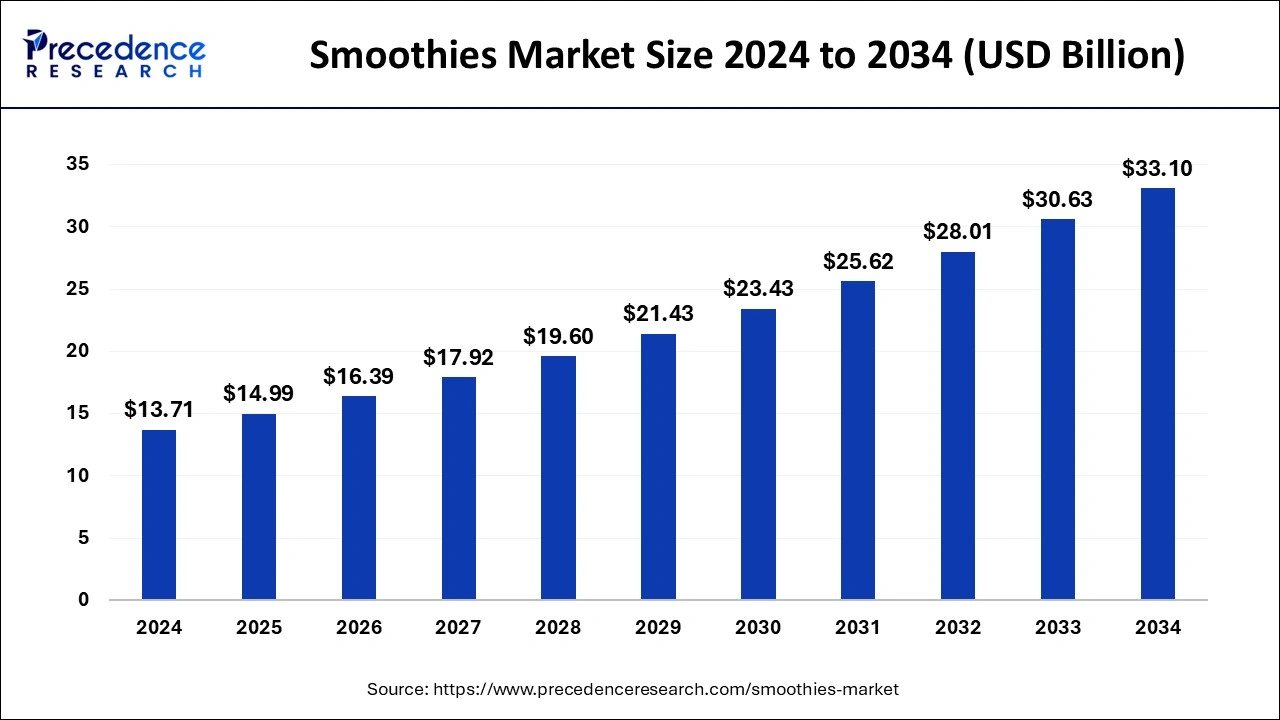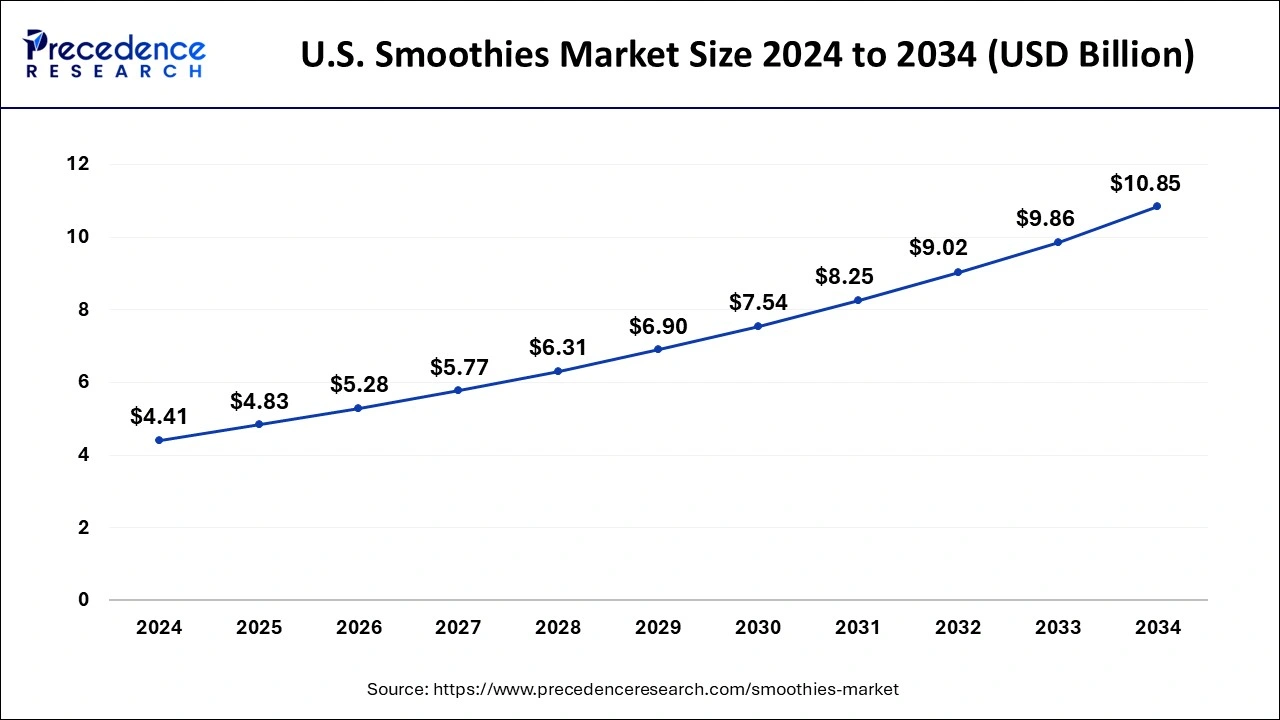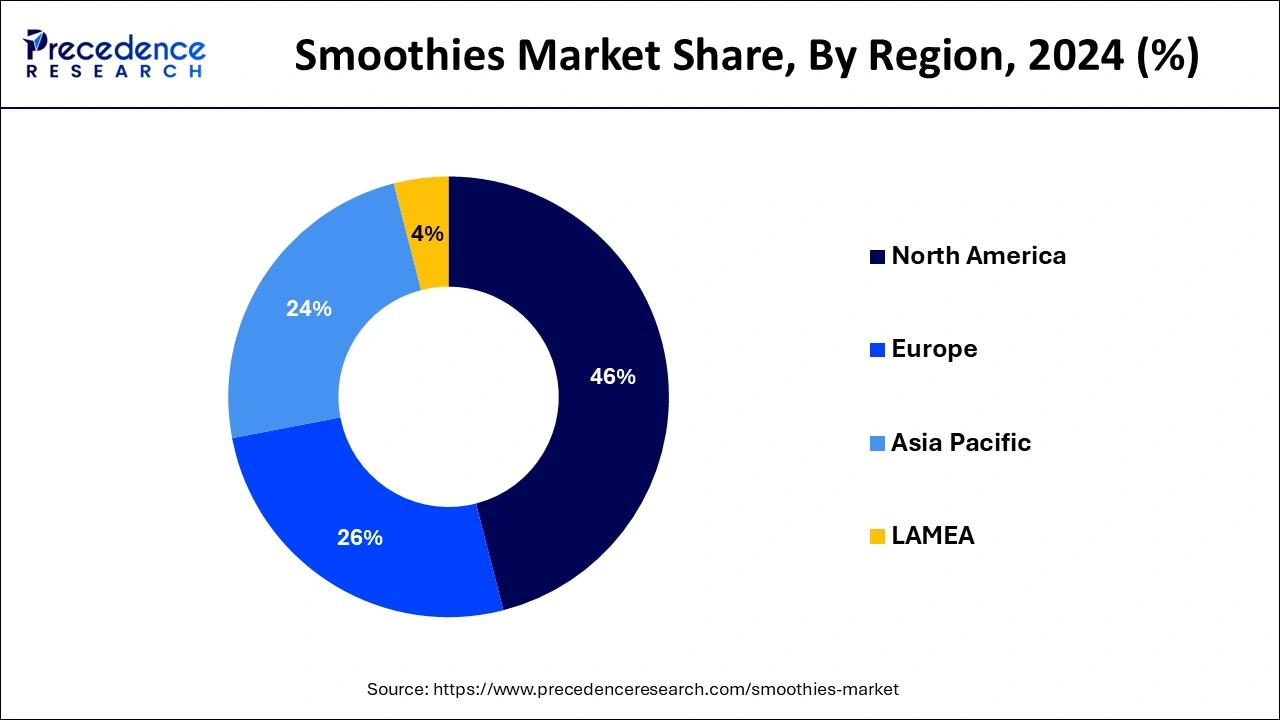The global smoothies market size is calculated at USD 14.99 billion in 2025 and is forecasted to reach around USD 33.10 billion by 2034, accelerating at a CAGR of 9.21% from 2025 to 2034. The North America smoothies market size surpassed USD 6.31 billion in 2024 and is expanding at a CAGR of 9.33% during the forecast period. The market sizing and forecasts are revenue-based (USD Million/Billion), with 2024 as the base year.
The global smoothies market size was estimated at USD 13.71 billion in 2024 and is predicted to increase from USD 14.99 billion in 2025 to approximately USD 33.10 billion by 2034, expanding at a CAGR of 9.21% from 2025 to 2034.

The U.S. smoothies market size was valued at USD 4.41 billion in 2024 and is anticipated to reach around USD 10.85 billion by 2034, poised to grow at a CAGR of 9.42% from 2025 to 2034.

North America led the market with the biggest market share of 46% in 2024, buoyed by a burgeoning population and substantial fruit consumption. This trend has spurred scientific and manufacturing endeavors towards a circular economy, facilitating the recycling and valorization of waste materials to reintegrate into the food supply chain.

As such, businesses operating within the smoothies market in North America must innovate and diversify their offerings to capitalize on emerging consumer trends and maintain competitiveness in a dynamic marketplace. Notably, the U.S. functional beverage market is experiencing significant expansion, with heightened interest in energy, hydration, and protein-enhanced offerings.
The smoothies market offers beverages that represent a versatile and nutritious option for consumers seeking a convenient and flavorful means to enhance their dietary intake. These blended beverages offer a spectrum of flavors and nutritional profiles, catering to diverse preferences and dietary needs. With an average homemade smoothie containing 175 to 450 calories within an 8- to 12-ounce serving, they serve as a balanced meal replacement or supplement, providing a valuable source of essential nutrients.
During the COVID-19 pandemic, heightened awareness of health and immunity has spurred individuals to prioritize nutrient-rich foods. Smoothies emerge as a compelling solution, enabling individuals to effortlessly incorporate a variety of fruits, vegetables, and dairy or plant-based proteins into their diets. By utilizing whole fruits and vegetables rather than solely relying on juices, smoothies maximize nutrient absorption and support overall well-being.
The appeal of smoothies extends beyond their nutritional benefits to encompass factors such as convenience, taste, and affordability. This multifaceted appeal positions smoothie as a compelling choice for individuals seeking a balanced and satisfying dietary option. As such, integrating smoothies into school breakfast programs can notably augment fruit consumption among students, aligning with broader health and wellness initiatives. The adaptable nature of smoothies makes them an attractive solution for individuals striving to optimize their dietary habits amidst evolving health considerations.
| Report Coverage | Details |
| Growth Rate from 2025 to 2034 | CAGR of 9.21% |
| Market Size in 2025 | USD 14.99 Billion |
| Market Size by 2034 | USD 33.10 Billion |
| Base Year | 2024 |
| Forecast Period | 2025 to 2034 |
| Segments Covered | By Product Type and By Distribution Channel |
| Regions Covered | North America, Europe, Asia-Pacific, Latin America, and Middle East & Africa |
Convenience and nutritional value
The convenience and nutritional benefits of smoothies serve as key drivers in propelling the growth of the smoothies market. Smoothies cater to the demands of busy individuals and families seeking convenient dietary solutions by offering a quick and effortless means of obtaining a nourishing meal or snack. Their minimal preparation requirements and ability to be prepared in large batches enhance their appeal to time-constrained consumers. Equipped with a blender and basic ingredients, consumers can effortlessly craft satisfying and nutrient-rich smoothies suitable for consumption at home or while on the go.
The versatility of smoothies, which can incorporate a diverse array of fruits, vegetables, and other nutrient-rich components, positions them as a valuable source of essential vitamins, minerals, and antioxidants. The nutritional composition of smoothies can be tailored to meet specific dietary needs, providing consumers with options rich in fiber, protein, healthy fats, and other essential nutrients crucial for optimal bodily function. This adaptability underscores smoothies' appeal as a convenient and customizable dietary option, driving sustained growth of the smoothies market as consumers increasingly prioritize health-conscious food choices in their daily routines.
Enhanced energy and cognitive benefits
Smoothies emerge as a potent source of sustained energy, harnessing the power of nutrient-rich ingredients abundant in complex carbohydrates and energy-boosting nutrients. Laden with antioxidants found in berries, leafy greens, and nuts, they not only bolster brain function but also mitigate the risk of cognitive decline, amplifying their appeal to health-conscious consumers. Smoothies seamlessly integrate into healthy weight management plans, offering satiety and satisfaction as meal replacements.
By curbing food cravings and facilitating adherence to calorie-controlled diets, they serve as a strategic tool in promoting dietary discipline. The protein and fiber content in smoothies plays a pivotal role in promoting fullness and reducing the inclination toward unhealthy snacks and processed foods. Smoothies prolong satiety, curbing the urge for impulsive snacking and fortifying digestive health by leveraging high-fiber ingredients like leafy greens, fruits, and seeds.
Limitations due to concerns related to sugar intake
The inclusion of free sugars, comprising added sugars like honey and maple syrup, presents a significant restraint on the expansion of the smoothies market. As consumers increasingly prioritize dental health and seek to manage energy intake for weight maintenance, the need to reduce free sugar consumption becomes paramount. Even with the addition of nutrient-rich vegetables such as spinach or kale, smoothies are susceptible to high sugar content, thus hindering widespread adoption among health-conscious consumers. This heightened awareness surrounding the adverse effects of free sugars acts as a deterrent, limiting the market's growth potential.
Obesity risks
The perception that smoothie consumption may exacerbate obesity presents a significant restraint on the expansion of the smoothies market. This concern stems from the notion that liquid or semi-liquid foods fail to adequately satiate hunger and appetite compared to solid foods, potentially leading to overconsumption of calories. Consuming calories in liquid form may not provide the same level of satiety as solid food, prompting individuals to seek additional calorie intake later to satisfy hunger. Furthermore, the common inclusion of sweeteners like ice cream, honey, or sweetened yogurt in smoothie recipes can elevate sugar content, exacerbating concerns regarding excessive calorie intake and weight management.
As health-conscious consumers prioritize dietary choices that promote satiety and weight control, addressing these concerns surrounding smoothie consumption becomes imperative for market growth. Industry stakeholders must innovate by offering lower-sugar options and emphasizing the nutritional benefits of smoothies without compromising taste or satisfaction. By proactively addressing obesity-related apprehensions, businesses can mitigate this restraint and foster greater consumer trust in the smoothies market.
Innovative packaging and advertisement strategies
The introduction of innovative packaging presents a promising opportunity for the smoothies market. Through rigorous in-vitro evaluation, this packaging has demonstrated antimicrobial efficacy against pathogens such as Listeria monocytogenens and Lactobacillus plantarum, ensuring the safety and freshness of smoothies.
Additionally, a preliminary assessment of lysozyme release kinetics under various conditions has been conducted, revealing its potential influence on key smoothie quality parameters. Leveraging bag-in-box and pouch packaging solutions, brands can offer eco-conscious packaging options that not only maintain product integrity from fill through end-use but also align with consumers' sustainability preferences with the integration of aseptic technology, smoothie products become shelf-stable and preservative-free, eliminating the need for refrigeration and enhancing convenience for consumers. This innovation opens doors for expanded distribution channels and extends market reach, catering to on-the-go consumers seeking convenient and nutritious beverage options.
Ultrasound technology for enhanced nutritional quality
The rising consumer demand for fresh, safe, and healthy food and beverage options has spurred innovation within the smoothies market. Traditional preservation methods often compromise nutritional quality, prompting food scientists to explore alternative solutions. Ultrasound technology emerges as a promising avenue for producing minimally processed fruits, vegetables, fruit juices, and smoothies that boast superior nutritional profiles and extended shelf life.
By harnessing ultrasound technology, manufacturers can maintain the nutritional integrity of ingredients while effectively preserving their freshness and safety. This innovative approach addresses consumer expectations for high-quality, health-conscious products, positioning ultrasound-processed smoothies as a preferred choice among discerning consumers.
The adoption of ultrasound technology aligns with broader industry trends centered around health and wellness, catering to modern consumers who prioritize nutrition and seek convenient yet wholesome dietary options. With enhanced nutritional value and prolonged shelf life, smoothies produced using ultrasound technology have the potential to capture a larger market share and capitalize on the growing demand for premium, health-enhancing beverages.
The fruit-based segment commanded a dominating share in 2024, owing to its inherent nutritional benefits and consumer appeal. Smoothies, laden with essential nutrients and wholesome ingredients, serve as natural energy boosters, leveraging the nutrient-rich profile of fruits such as bananas, green vegetables, and berries to provide a potent blend of vitamins, minerals, and carbohydrates. This nutrient-dense composition fuels the body, keeping consumers energized throughout the day. Regular consumption of fruit-based smoothies offers additional benefits beyond energy enhancement.
These beverages support collagen production, aiding in maintaining a youthful appearance. Rich in antioxidants sourced from berries, citric fruits, and green vegetables, smoothies combat free radicals that contribute to premature aging and skin damage, promoting healthy, radiant skin. The compelling combination of nutritional efficacy and skincare benefits propels the growth of the smoothies market, enticing consumers with the promise of holistic well-being. As health-conscious consumers increasingly prioritize nutritious and rejuvenating options, fruit-based smoothies emerge as a favored choice, driving sustained market expansion and innovation.
In 2024, smoothie bars have emerged as a dominant distribution channel within the burgeoning smoothies market, fueled by increasing consumer demand for healthier food options. As consumers prioritize health-conscious choices, businesses in the juice and smoothie bar industry are poised for significant growth in the coming years. Successful smoothie bars excel by offering functional and convenient products made from fresh, natural ingredients that resonate with consumer preferences.
Smoothie bars can educate customers about their offerings and the health benefits they provide by leveraging social media platforms effectively. Regular distribution of business cards further enhances exposure and fosters brand recognition. The growing health consciousness among consumers is a driving force behind increased sales within the smoothie bar industry. With people increasingly vigilant about the nutritional content of their food, smoothie bars provide a convenient and accessible solution for incorporating fresh fruits, vegetables, and other nutritious ingredients into daily diets.
By Product Type
By Distribution Channel
By Geography
For inquiries regarding discounts, bulk purchases, or customization requests, please contact us at sales@precedenceresearch.com
No cookie-cutter, only authentic analysis – take the 1st step to become a Precedence Research client